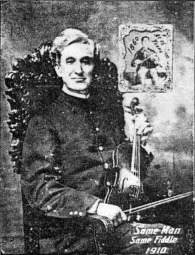Annotation:Old Catville Quadrille: Difference between revisions
m (Text replacement - "garamond, serif" to "sans-serif") |
No edit summary |
||
| Line 1: | Line 1: | ||
== | __NOABC__ | ||
<div class="noprint"> | |||
<p><font face="Century Gothic" size="4"> Back to [[{{BASEPAGENAME}}]] </font></p> | |||
</div> | |||
---- | ---- | ||
<p><font face=" | {{#lst:{{PAGENAME}}|abc}} | ||
'''OLD CATVILLE QUADRILLE.''' Paul Gifford notes the first change of this quadrille is a variant of the tune known as "[[Whalen's Breakdown]]" (in 2/4 time) and the first strain of "[[Bride of the Wind]](s)" (in jig time). Musicologist | ---- | ||
<div style="page-break-before:always"></div> | |||
<p><font face="Century Gothic" size="3"> | |||
<div style="text-align: justify; direction: ltr; margin-bottom: 90px; margin-left: 70px; margin-right: 120px;"> | |||
<br> | |||
'''OLD CATVILLE QUADRILLE.''' American, Jig or Quadrille (6/8 time). Paul Gifford notes the first change of this quadrille is a variant of the tune known as "[[Whalen's Breakdown]]" (in 2/4 time) and the first strain of "[[Bride of the Wind]](s)" (in jig time). Musicologist Gifford says [http://www.giffordmusic.net/Six%20Eight%20in%20C.html] the tune is "almost universal" to Michigan fiddlers in both 2/4 and 6/8 time versions, although no one name appears to have held command. He doubts claims for a Canadian provenance (as in "Bride of the Winds," credited to Jim Magill by Jarman & Co., 1951), and instead believes it was once a tune in wide dissemination. He calls it simply "6/8 in C." | |||
<br> | <br> | ||
<br> | <br> | ||
| Line 30: | Line 38: | ||
''of WEAF's radio listeners. '' | ''of WEAF's radio listeners. '' | ||
</blockquote> | </blockquote> | ||
See also eastern Nebraska fiddler Bob Walters' (1889-1960) similar untitled "[[Quadrille (29)]]." | |||
<br> | |||
<br> | <br> | ||
</div> | |||
</font></p> | </font></p> | ||
<p><font face=" | <div class="noprint"> | ||
''Source for notated version'': | <p><font face="Century Gothic" size="3"> '''Additional notes''' </font></p> | ||
<p><font face="Century Gothic" size="3"> | |||
<font color=red>''Source for notated version''</font>: - | |||
<br> | <br> | ||
<br> | <br> | ||
</font></p> | </font></p> | ||
<p><font face=" | <p><font face="Century Gothic" size="3"> | ||
''Printed sources'': | <font color=red>''Printed sources''</font> : - | ||
<br> | <br> | ||
<br> | <br> | ||
</font></p> | </font></p> | ||
<p><font face=" | <p><font face="Century Gothic" size="3"> | ||
''Recorded sources'': <font color=teal>Columbia 231-D/Harmony 5103, Col. John Pattee (1924).</font> | <font color=red>''Recorded sources'': </font> <font color=teal> -Columbia 231-D/Harmony 5103, Col. John Pattee (1924).</font> | ||
<br> | <br> | ||
<br> | <br> | ||
</font></p> | </font></p> | ||
<p><font face="sans-serif" size=" | <p><font face="sans-serif" size="3"> | ||
See also listing at:<br> | See also listing at:<br> | ||
Hear Pattee's recording at Michigan Fiddlers [http://www.michiganfiddle.com/repository]<br> | Hear Pattee's recording at Michigan Fiddlers [http://www.michiganfiddle.com/repository]<br> | ||
See notes and examples from "Paul Gifford's Collection of Old-Time Fiddling, Duclimer playing, and Songs from Michigan and the Great Lakes Region" [http://www.giffordmusic.net/Six%20Eight%20in%20C.html]<br> | See notes and examples from "Paul Gifford's Collection of Old-Time Fiddling, Duclimer playing, and Songs from Michigan and the Great Lakes Region" [http://www.giffordmusic.net/Six%20Eight%20in%20C.html]<br> | ||
</font></p> | </font></p> | ||
<br> | <br> | ||
---- | ---- | ||
== | <p><font face="Century Gothic" size="4"> Back to [[{{BASEPAGENAME}}]] </font></p> | ||
</div> | |||
__NOEDITSECTION__ | |||
__NOTITLE__ | |||
Revision as of 17:17, 28 October 2019
X:0 T: No Score C: The Traditional Tune Archive M: K: x
OLD CATVILLE QUADRILLE. American, Jig or Quadrille (6/8 time). Paul Gifford notes the first change of this quadrille is a variant of the tune known as "Whalen's Breakdown" (in 2/4 time) and the first strain of "Bride of the Wind(s)" (in jig time). Musicologist Gifford says [1] the tune is "almost universal" to Michigan fiddlers in both 2/4 and 6/8 time versions, although no one name appears to have held command. He doubts claims for a Canadian provenance (as in "Bride of the Winds," credited to Jim Magill by Jarman & Co., 1951), and instead believes it was once a tune in wide dissemination. He calls it simply "6/8 in C."
"Old Catville Quadrille" was recorded by 'Colonel' John A. Pattee [2] [3] (1844-1924) for Columbia in 1923--"Catville" was the former name of Pattee's hometown, New Boston, Michigan. Pattee was a Civil War veteran, having served with the 24th Michigan Infantry Regiment and been posted to a gun battery for the Iron Brigade through many of the war's most vicious battles. Although he never attained the rank of 'colonel' (a self-promotion for the stage), he was instrumental in forming a vaudeville act in 1904 called the Old Soldiers Fiddlers, in which two Southern and two Northern fiddlers played their regional music, and, in reconciliation, played together (with handshakes).

Colonel John A. Pattee, old soldier fiddler and favorite of WEAFS Radio Audience, will never stand before a microphone again. This unfortunate news came with word of his death which cancelled his radio barn dance from WEAF scheduled for Saturday Evening, Dec. 20, 1924,
Colonel Pattee was 80 years of age and a civil war veteran, having served in the twenty- fourth Michigan Volunteer Infantry, called the "Iron Brigade, " which opened the Battle of Gettysburg.
On numerous occasions he has appeared on WEAF's programs, playing the old dance tunes on his fiddle just as he played them before the civil war days.
His voice, calling out each tune in the fashion of the country fiddler, won for him a warm spot in the hearts of WEAF's radio listeners.
See also eastern Nebraska fiddler Bob Walters' (1889-1960) similar untitled "Quadrille (29)."
